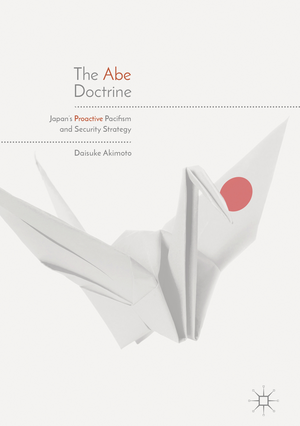The Abe Doctrine: Japan's Proactive Pacifism and Security Strategy
Autor Daisuke Akimotoen Limba Engleză Hardback – 16 feb 2018
| Toate formatele și edițiile | Preț | Express |
|---|---|---|
| Paperback (1) | 723.24 lei 6-8 săpt. | |
| Springer Nature Singapore – 9 feb 2019 | 723.24 lei 6-8 săpt. | |
| Hardback (1) | 1000.70 lei 6-8 săpt. | |
| Springer Nature Singapore – 16 feb 2018 | 1000.70 lei 6-8 săpt. |
Preț: 1000.70 lei
Preț vechi: 1220.37 lei
-18% Nou
Puncte Express: 1501
Preț estimativ în valută:
191.51€ • 197.84$ • 159.38£
191.51€ • 197.84$ • 159.38£
Carte tipărită la comandă
Livrare economică 25 martie-08 aprilie
Preluare comenzi: 021 569.72.76
Specificații
ISBN-13: 9789811076589
ISBN-10: 9811076588
Pagini: 300
Ilustrații: XV, 246 p. 22 illus. in color.
Dimensiuni: 148 x 210 x 22 mm
Greutate: 0.47 kg
Ediția:1st ed. 2018
Editura: Springer Nature Singapore
Colecția Palgrave Macmillan
Locul publicării:Singapore, Singapore
ISBN-10: 9811076588
Pagini: 300
Ilustrații: XV, 246 p. 22 illus. in color.
Dimensiuni: 148 x 210 x 22 mm
Greutate: 0.47 kg
Ediția:1st ed. 2018
Editura: Springer Nature Singapore
Colecția Palgrave Macmillan
Locul publicării:Singapore, Singapore
Cuprins
1. Introduction.- 2. Prime Minister Shinzo Abe and 'Proactive Contribution to Peace'.- 3. The 15 Cases: Simulations for the Peace and Security Legislation.- 4. The Abe Government and the Right to Collective Self-Defense.- 5. The Domestic Implication: Japan's Ballistic Missile Defense Policy.- 6. The Bilateral Implication: The Development of the Japan-US Alliance.- 7. The Global Implication: Japan's Peace Operations in South Sudan.- 8. The Abe Doctrine: Emergence of Japan's New Grand Strategy.- 9. Conclusion.
Recenzii
“Akimoto’s The Abe Doctrine provides a very solid introduction to the complex terrain of Japan’s military security policies that increasingly have both breadth and depth beyond what most readers will be familiar with— without deluging the reader with details or using difficult jargon.” (Andrew Oros, Pacific Affairs, Vol. 94 (2), June, 2021)
Notă biografică
Daisuke Akimoto is former Assistant Professor at the Soka University Peace Research Institute and the author of Japan as a Global Pacifist State (2013). He holds PhD in Asian Studies and International Relations from the University of Western Sydney, MA in Peace and Conflict Studies from the University of Sydney, and BA in Humanities from Soka University, Japan. He has worked as a secretary in the House of Representatives, Japan.
Textul de pe ultima copertă
This book focuses on Prime Minister Abe’s policy toward international peace and security proposed in 2013 under the basic principle of ‘proactive contribution to peace’. To this end, this book investigates Prime Minister Abe’s policy-making process of the Peace and Security Legislation, which transformed Japan’s security policy and enabled Japan to exercise the right of ‘collective self-defense’, which used to be ‘unconstitutional’. This book evaluates the implications of the Peace and Security Legislation on three fronts, domestic, bilateral, and international, by analyzing Japan’s Ballistic Missile Defense (BMD) program, the Japan-US alliance system, and Japan’s policy on international peacekeeping operations in South Sudan. This book is one of the first contributions to the research on Japan’s foreign and security policy under the Shinzo Abe administration and will be of interest to scholars, policymakers, and students of Japan, Japanese politics and international relations of the Asia-Pacific region.
Caracteristici
Provides academic and policy information on the 'Abe Doctrine' Explores the international trajectory of Japan's foreign and security policies in the next three to five years Demonstrates how the policy components of the 'Abe Doctrine' will be Japan's new grand strategy
